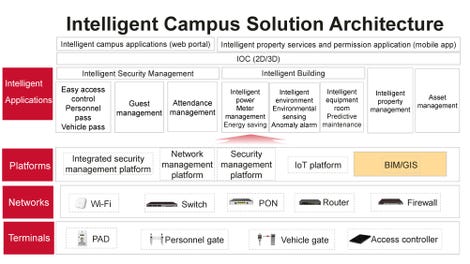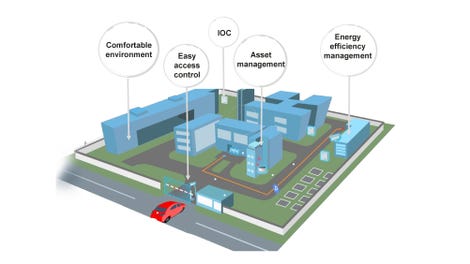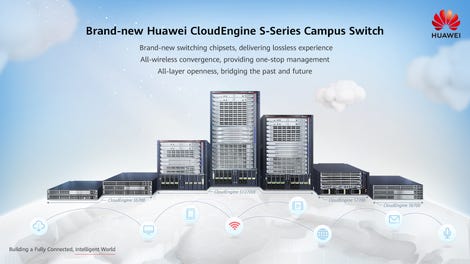Intelligent Campus Technology is reimagining office space
In September 2021, over 4 million workers quit their jobs, sparking a worldwide phenomenon known as the Great Resignation.
When the pandemic hit, ICT solutions were deployed almost overnight to enable people to work from home and business to continue. Two years on, many workers who’ve been freed from long commutes and expensive city living don’t want to return to the old ways and that includes office life. As the new normal continues to evolve, the hybrid work model has emerged as the dominant preference. Enterprises have had to adopt technologies that support working from home, remote working, and cloud-based working.
Set to preview at Mobile World Congress 2022 in Barcelona, Huawei’s smart, connected and energy efficient Intelligent Campus is helping employers provide an enhanced technology experience in the new hybrid workplace.
What workers want
According to a survey, 58% of knowledge workers have returned to work in hybrid mode and they’re clear about what the future of job satisfaction looks like:
- flexibility regarding location and hours – 72% of workers who are unhappy with current workplace flexibility are likely to look for a new job in the next 12 months
- technology that works and is easy to use – frustration with poorly functioning computers, networks and systems has emerged as one factor driving resignations, especially in the technology sector
- intuitive collaboration tools that foster engagement and productivity
- a comfortable workplace.
With 77% of respondents stating relationships with colleagues are one of the most important factors in job satisfaction, there is also a need to rebuild a sense of community in the workplace.
Intelligent Campus technology integrates smart digital technologies such as the Internet of Things (IoT), mobile internet, and geographic information systems (GIS) to seamlessly connect people, vehicles, and devices across campus. Full data convergence, status visibility, service management, and event management help make campuses safer, more comfortable places with features such as:
- sophisticated intelligence identification of staff and vehicles for easy access
- fast, automatic temperature adjustment for a comfortable environment, reducing unnecessary heat or air conditioning when the office space is vacant and helping companies to achieve sustainability or carbon neutrality goals
- efficient property management with calls for repairs, and permissions on mobile apps.


What organisations need
More comfortable, hi-tech workplaces deliver benefits for employees but organisations also need solutions that work at a management and operational level.
As SIFMA president, Tony Khoo, points out, “As communication and technology advance, the science of building systems and campuses have become more sophisticated and complex. It’s becoming harder for facility managers to manage them effectively. There is a great need to leverage technologies so we can manage campuses more smartly and productively.”
Intelligent Campus solutions provide data-driven, interconnected systems with minimal labor requirements that meet the needs of a complex user matrix that includes stakeholders such as landlords, facility operators, and managers.
Enhanced security is provided through multiple perimeter protection methods that reduce false positives by 95%, and target recognition access control that leaves zero error or omission. This includes visualised, manageable, and controllable BIM/GIS devices, as well as asset management that requires no manual counting with radio frequency identification.
Campus management of both web portal and mobile applications is delivered through an easy to install multi-layered framework that reduces dependencies and cost.
The Intelligent Campus offers a four-layer solution:
- Terminal (device): access control systems, road gates, brakes, and southbound subsystem devices provided by third parties
- Network: includes wired and wireless networks of the campus network
- Platform: includes the IoT platform, integrated security management platform, and other third-party service application platforms
- Application: data collection and integration are implemented through system interconnection. Data and service visualisation, event management and processing, and operation analysis and decision-making are used to achieve centralised operation scheduling. Basic functions and application modules include the intelligent operation center, unified display, and smart security, building, property, and service management.
Energy saving at scale
More people and more connected devices across more locations has put a burden on energy saving and traditional campus IT infrastructure is struggling to meet requirements.
With many businesses committed to carbon neutrality targets, current levels of integration and interconnection have made it increasingly difficult to manage campus energy efficiency while maintaining security and efficiency.
Intelligent Campus technology is one unified system that reduces energy consumption by more than 10%, thanks to the intelligent algorithms that utilizes the campus environment and thermal data to set the optimal on/off time point and running mode of the cooling system
Energy smart technology can easily handle extensive devices and environments including equipment rooms that can more efficiently maintain complex systems.
What does this look like in action?
In 2021, a pandemic-driven 160% increase in UnionBank of the Philippines’ mobile banking customer base prompted the need a more powerful network that could reliably enable 24/7 productivity, support six sigma delivery, and T+0 service. The bank’s San Pedro campus opened that year with Huawei’s scalable, intelligent network architecture that leveraged future-proof virtualisation and cloud technologies. The result was improved business efficiency, processes, and competitiveness.

“Union Bank of the Philippines has disrupted traditional banking channels by re-imagining and re-engineering customer touchpoints,” says Dennis Omila, CIO, UnionBank of the Philippines.
“With our new generation Innovation Campus, we’ve partnered with Huawei to build a network system based on the SDN technical architecture deploying Huawei CloudEngine data center switches and Huawei iMaster NCE intelligent network management and control system to implement intelligent network deployment, elastic scaling and agile service rollout,” Mr Omila adds.
For UnionBank, key benefist brought by Huawei solution include:
- Fully redundant Data Center and Campus Network – ensuring high network reliability and expectation of no service interruptions.
- Intelligent SDN Architecture – leveraging the new technology of software defined network to eliminate manual processes.
- Intelligent network – powered by the revolutionary Explicit Congestion Notification and Intelligent Lossless algorithm.
- Ultra-broadband and elasticity – meeting smooth evolution requirements to enable the bank’s digital transformation.
- 100% network visibility and automated O&M – creating a reliable and easy way to manage environment.
Leveraging these innovations has led to an industry-first facility will serve as an incubator for cultivating new talent. The bank is developing an engaged and connected workforce that will deliver on their goal of serving customer needs in the new economy.
UnionBank is just one of 500 such projects the company has undertaken globally. Huawei Enterprise Business Group vice president, Bob Chen, says “We are working with our customers to help them deal with change and build a smart world together,” he says. “The intelligent campus of the future will integrate people, machines, and things – and we are committed to building secure, smart, green campuses for operators, managers, and owners.”
The evolution of the modern workplace
1950s corner offices, crowded desks, manual typewriters and adding machines
1960s the open plan office and the electric typewriter
1970s fax machines and floppy disks
1980s desktop computers arrive, along with the first .com address
1990s email, mobile phones, and pagers
2000s remote working, social media, and the smartphones
2010s work life balance becomes a priority, and online tools enable remote working
2020s intelligent campuses and a hybrid workforce
Huawei will team up with industry partners at Mobile World Congress (MWC) 2022 in Barcelona, to showcase innovative solutions and practices, spanning government and public sector to finance, transportation, energy, manufacturing, and Internet Service Providers (ISPs). At MWC 2022 Huawei will focus on industrial digital transformation, digital infrastructure innovation, and carbon emissions reduction. In addition, Huawei will release a series of scenario-based industry solutions, full-stack data centre and intelligent campus solutions, as well as the company’s latest datacom, optical, and storage products.
Find out more about Huawei’s intelligent campus innovations at the 2022 Mobile World Congress in Barcelona
